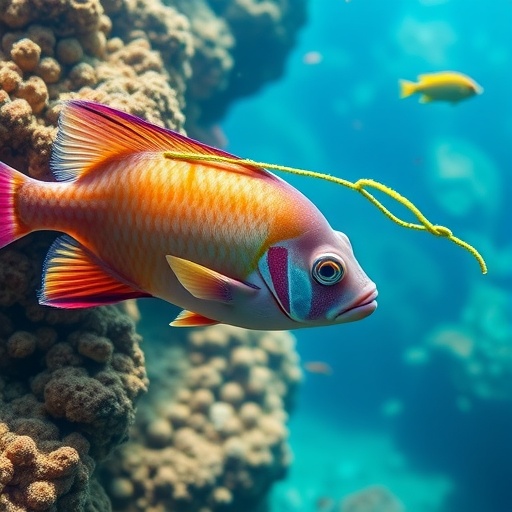Recent research conducted by Poulos, Brooker, and McCormick has unveiled crucial insights into the intricate dynamics of reef fish populations, particularly focusing on how prior residents of these underwater ecosystems can significantly influence the success of newly arriving species. The findings, published in the esteemed journal Coral Reefs, underscore the implications of ecological interactions for both conservation efforts and the management of marine biodiversity.
In coral reef ecosystems, the interplay between different species forms an often complex web of interactions that dictate survival, growth, and reproduction rates. This study specifically examines the concept of density-dependent success, a phenomenon where the population density of existing residents can impact the establishment and growth of newcomers. The researchers conducted extensive field experiments to unravel these dynamics, marking a significant step forward in marine ecological studies.
The research focuses on how certain species, particularly juvenile reef fish, depend heavily on the presence of established residents within their habitat. By analyzing how these prior residents alter the ecological landscape, the study illustrates that the relationship between established fish and new arrivals is not merely competitive but involves intricate social cues and mutual influences. This paradigm shift opens up new avenues for understanding the behavioral strategies employed by reef fish and their adaptive responses to fluctuating environmental conditions.
The implications of the study are profound, particularly in the context of ongoing challenges faced by coral reefs, including habitat degradation, overfishing, and climate change. The ability of new fish to successfully integrate into established communities can have cascading effects on the status of the reef, impacting everything from biodiversity to ecosystem resilience. Therefore, the findings highlight the urgent need for holistic approaches to reef conservation that take into account the complexities of species interactions.
One particularly intriguing aspect of the study is the observation that some species exhibit a remarkable affinity for certain ecological niches, which can be safeguarded or jeopardized by the densities of existing populations. This specificity among species suggests a finely tuned balance where any disruption, whether through human activity or environmental change, could lead to significant shifts in community structure and function.
Furthermore, the research raises critical questions regarding the management of fish stocks in reef areas. Traditional approaches often fail to consider the relational dynamics between different species, leading to policies that may inadvertently favor established species at the expense of newcomers. This oversight could stymie the recovery of fish populations in areas affected by overfishing or habitat loss, rendering conservation efforts less effective than anticipated.
In addition to the academic significance of these findings, their implications for marine policy are immense. The study provides a foundational understanding that could inform future regulations aimed at sustaining both wildlife populations and the fishing industries that depend on them. As scientists and policymakers grapple with the realities of ecological shifts, the importance of integrating social behavioral insights into resource management cannot be overstated.
Comparative studies across varying reef systems could further bolster these findings and lead to generalized models of fish community dynamics. Previous studies had largely focused on individual species responses to environmental stressors, but Poulos and colleagues redirect attention to the relational aspect of species survival, which may unravel previously underappreciated mechanisms driving reef community dynamics.
With coral reefs being one of the most diverse ecosystems on the planet, preserving their functionality is crucial to maintaining global marine biodiversity. This research serves as a clarion call for renewed efforts to monitor and understand population dynamics in the face of rapid environmental changes. It also emphasizes the interconnectedness of ecosystems and the potential for broader ecological insights.
While ecological research often uncovers alarming trends regarding biodiversity loss, this study offers a glimmer of hope by showcasing the resilience and adaptability of certain coral reef fish. By understanding how prior residents can facilitate the success of new arrivals, conservation strategies can be designed not only to protect existing populations but also to promote the recovery of species that may be struggling to establish themselves.
Ultimately, the research by Poulos, Brooker, and McCormick serves as a landmark contribution to marine biology, paving the way for future inquiries into fish recruitment dynamics. By demonstrating the critical influence of established residents, it challenges researchers and environmentalists alike to reconsider existing paradigms about species dominance and community structure within reef ecosystems.
In conclusion, the complex interdependencies highlighted in this study advocate for a more nuanced understanding of reef fish populations. As scientists continue to investigate the implications of these interactions across various ecosystems, it becomes increasingly clear that our approach to marine conservation must be as dynamic and multifaceted as the ecosystems we seek to protect.
As the burden of anthropogenic pressures on marine environments grows heavier, continued research into the intricate social dynamics of reef fish will be essential in guiding effective conservation practices. The findings not only deepen our understanding of ecological relationships but also set a precedent for integrating behavioral ecology into the broader conversation surrounding marine management and protection.
In an era where scientific understanding can significantly shape policy and public perception, the insights generated by this research call for urgency in addressing the challenges that coral reefs face. The health of our oceans depends on our capacity to adapt our strategies based on emerging evidence, and the revelations presented here offer a promising pathway forward.
Subject of Research: Density-dependent success in reef fish populations and the impact of prior residents on newly arriving species.
Article Title: Prior residents mediate density-dependent success in newly arriving reef fish.
Article References:
Poulos, D.E., Brooker, R.M. & McCormick, M.I. Prior residents mediate density-dependent success in newly arriving reef fish.
Coral Reefs (2025). https://doi.org/10.1007/s00338-025-02782-y
Image Credits: AI Generated
DOI: https://doi.org/10.1007/s00338-025-02782-y
Keywords: Reef fish, density-dependence, ecological interactions, marine conservation, species dynamics.




